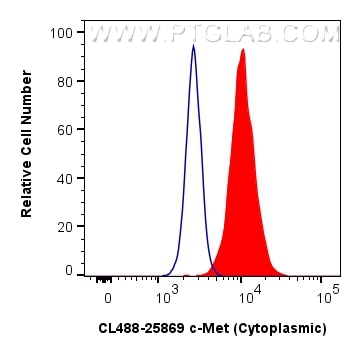Tested Applications
| Positive FC (Intra) detected in | HeLa cells |
Recommended dilution
| Application | Dilution |
|---|---|
| Flow Cytometry (FC) (INTRA) | FC (INTRA) : 0.40 ug per 10^6 cells in a 100 µl suspension |
| It is recommended that this reagent should be titrated in each testing system to obtain optimal results. | |
| Sample-dependent, Check data in validation data gallery. | |
Product Information
CL488-25869 targets c-Met (Cytoplasmic) in FC (Intra) applications and shows reactivity with human, mouse, rat, canine samples.
| Tested Reactivity | human, mouse, rat, canine |
| Host / Isotype | Rabbit / IgG |
| Class | Polyclonal |
| Type | Antibody |
| Immunogen |
CatNo: Ag23140 Product name: Recombinant human MET protein Source: e coli.-derived, PGEX-4T Tag: GST Domain: 965-1085 aa of BC130420 Sequence: GSELVRYDARVHTPHLDRLVSARSVSPTTEMVSNESVDYRATFPEDQFPNSSQNGSCRQVQYPLTDMSPILTSGDSDISSPLLQNTVHIDLSALNPELVQAVQHVVIGPSSLIVHFNEVIG Predict reactive species |
| Full Name | met proto-oncogene (hepatocyte growth factor receptor) |
| Calculated Molecular Weight | 1390 aa, 155 kDa |
| Observed Molecular Weight | 145 kDa |
| GenBank Accession Number | BC130420 |
| Gene Symbol | MET |
| Gene ID (NCBI) | 4233 |
| RRID | AB_3084093 |
| Conjugate | CoraLite® Plus 488 Fluorescent Dye |
| Excitation/Emission Maxima Wavelengths | 493 nm / 522 nm |
| Form | Liquid |
| Purification Method | Antigen affinity purification |
| UNIPROT ID | P08581 |
| Storage Buffer | PBS with 50% glycerol, 0.05% Proclin300, 0.5% BSA, pH 7.3. |
| Storage Conditions | Store at -20°C. Avoid exposure to light. Stable for one year after shipment. Aliquoting is unnecessary for -20oC storage. |
Background Information
c-Met (also named as MET or HGFR) is a receptor tyrosine kinase that transduces signals from the extracellular matrix into the cytoplasm by binding to HGF ligand. c-Met regulates many physiological processes including proliferation, scattering, morphogenesis and survival. The primary single chain precursor protein is post-translationally cleaved to produce the alpha and beta subunits, which are disulfide linked to form the mature receptor. Overexpression and/or mutation of c-Met has been reported in various human malignancies, including lung cancer, breast cancer, head and neck cancer, gastric cancer, colorectal cancer, bladder cancer, uterine cervix carcinoma, and esophageal carcinoma, c-Met could serve as an important therapeutic target (PMID: 26036285). The c-met receptor is a 190-kD glycoprotein consisting of a 145-kD membrane-spanning beta chain and a 50-kD alpha chain (PMID: 7806559). In Western blot, this antibody produces bands of unknown identity at 55 and 100 kDa.
Protocols
| Product Specific Protocols | |
|---|---|
| FC protocol for CL Plus 488 c-Met (Cytoplasmic) antibody CL488-25869 | Download protocol |
| Standard Protocols | |
|---|---|
| Click here to view our Standard Protocols |




